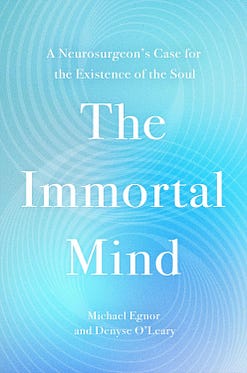 |
By Michael Egnor and Denyse O'Leary
|
Jun 13
|
When a loved one journeys toward death and bodily resources fail, the lights may seem to be going out, one by one. But then… they may come back on again, briefly. …
Science writer Jordan Kinard reported in Scientific American in 2023 that for decades, researchers, hospice workers, and family members have watched “with awe” as victims of dementia suddenly find their memories and personalities again, just before they die.
Of course, historical and traditional accounts of such deathbed scenes abound. But in recent years, medical researchers have also started studying this sudden, remarkable lucidity—terminal lucidity—weeks, days, or hours before death. Is it, as a materialist might say, mere noise from a dying brain? Or is it a signal, intimating what lies beyond? One research team confirms, “It happens unexpectedly: a person long thought lost to the ravages of dementia, unable to recall the events of their lives or even recognize those closest to them, will suddenly wake up and exhibit surprisingly normal behavior, only to pass away shortly thereafter.”
Even people who might prefer to believe that terminal lucidity is just random brain noise admit that they are not sure. Science writer Jesse Bering tells us, “I’m as sworn to radical rationalism as the next neo-Darwinian materialist. That said, over the years I’ve had to ‘quarantine,’ for lack of a better word, a few anomalous personal experiences that have stubbornly defied my own logical understanding of them.” Similarly, at Discover magazine, “Neuroskeptic” offers readers a remarkable account of terminal lucidity from the early twentieth century, stating, “I do not believe in miracles and this story didn’t change my mind on that score. However, unless we reject the whole story as a fiction, it is surely one of those ‘anomalies that neuroscience ought to be able to account for.’”
Well, yes. Neuroscience ought to be able to account for terminal lucidity. But why should that mean reassuring the world that someday we will prove that it is just random brain noise? That’s the trouble with materialism as a foundation for neuroscience. It comes to mean an endless search for materialist explanations that don’t really fit the evidence instead of seeing what we can learn from the evidence.
Just what is happening in the human brain during bouts of terminal lucidity remains unclear. Sam Parnia is director of research into resuscitation after heart attacks at New York University’s Langone Medical Center. He notes that in one multicenter study, one in five survivors of heart stoppage reported a lucid experience. He suggests that the lucidity is triggered by a spike in brain activity due to the loss of oxygen. But he does not dismiss these experiences as mere noise: Rather, in his view, the dying process “gives you access to parts of your brain that you normally can’t access.” As he told science media, the study—of which he is one of the authors—“found these experiences of death to be different from hallucinations, delusions, illusions, dreams, or CPR-induced consciousness.” …
Sometimes lucidity becomes a way of saying goodbye. Australian palliative care doctor Will Cairns notes that one of his patients, dying at home, was unresponsive for two days while his son was traveling to see him. But when the son arrived, he woke up to talk with him for several hours. Then he became unresponsive again, and a few hours later he died. Cairns asks:
How many times have nurses told us at morning handover that early the previous evening one of our patients who seemed stable and had been sleeping peacefully most of the time in our palliative care centre had roused themselves to an alertness not seen for ages and asked the nurses to summon their family for a meeting? After a period of conversation, the patient has gone back to sleep, and died later that night.
Modern palliative care furnishes many accounts that sound like the vast traditional literature on last words—a final communication at the point of death. The mind, sensing that the body is failing, rallies briefly for a purpose. Needless to say, such lucid episodes imply that the mind is more than the disjointed activities of a failing brain.
— Michael R. Egnor, MD, is Professor of Neurosurgery and Pediatrics at the Renaissance School of Medicine at Stony Brook University. He is the neurosurgery residency director and has served as the director of pediatric neurosurgery and as vice-chairman of neurosurgery at Stony Brook Medicine. Dr. Egnor was named one of New York’s best doctors by New York Magazine in 2005.
— Denyse O’Leary is the author or coauthor of several books on the topics of science, creation, design, and spirituality, including The Spiritual Brain: A Neuroscientist’s Case for the Existence of the Soul (coauthored by neuroscientist Mario Beauregard).
---
Excerpted from The Immortal Mind: A Neurosurgeon’s Case for the Existence of the Soul by Michael Egnor and Denyse O’Leary (Worthy Books, 2025). Used with permission.
Many scientists and doctors believe that there is no such thing as the soul. That there is no part of us that persists beyond death. We are not spiritual in any respect. We are made up of cells and tissue, and completely controlled by a material organ in our heads: the brain. In this groundbreaking book, Dr. Michael Egnor makes the case—based on 40 years of practice and over 7,000 brain surgeries—that science has gotten it all wrong.
The human brain is incredible, mysterious, and powerful. But it’s not what makes us who we are. The soul does that. Drawing on the most important research studies in neuroscience, Dr. Egnor presents evidence that the brain alone does not explain the mind. He explores, using modern neuroscience and his vast surgical experience, how inside every damaged brain there is a thinking, feeling person with a spiritual soul that transcends the brain. He also uses fascinating case studies to show how research on conjoined twins who share parts of their brains, on patients in deep coma who are still able to communicate with people around them, on near-death experiences, and on artificial intelligence all make a scientific case for the existence of the spiritual human soul.
Engaging, thought-provoking, and groundbreaking, The Immortal Mind shows here that some aspect of who we are is spiritual and immortal, transcending the physical body.
“Who better to tell us about the mind than a highly experienced brain surgeon who has performed surgery on literally thousands of brains, probed deep into the brain with electrodes, and treated people with brain injuries?... The Immortal Mind makes a compelling scientific case against a purely materialistic view of the human person.”
― Nancy Pearcey, professor and scholar in residence at Houston Christian University; author of Love Thy Body and The Toxic War on Masculinity
“This book blew me away. As I read it, I shared many of the stories with my wife. Why? While I have studied the philosophy of mind since graduate school in the early 2000s, Dr. Egnor makes some fresh insights because of his training and experience as a neurosurgeon. If you want to know if there’s good evidence for the existence of the soul, The Immortal Mind book is a must-read.”
― Sean McDowell, Ph.D., professor of apologetics at Talbot School of Theology
Find The Immortal Mind at Amazon, Barnes & Noble, Christianbook.com, and Bookshop.org.
*sponsored











